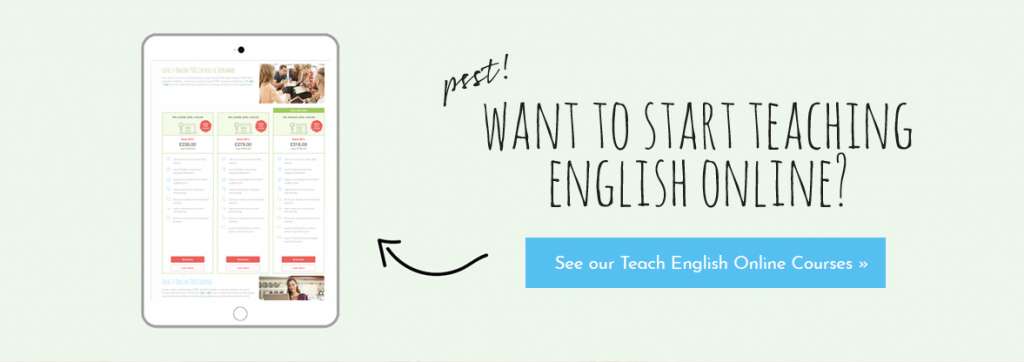Want to learn more about how to host online English lessons and insider tips and tricks? We’ve got you! Experienced online TEFL tutor, Lisa held her second live Facebook webinar on Wednesday 8th July 2020 at 3pm – if you didn’t catch it, here it is:
[Or click here to watch it on Facebook.]
Lisa’s been teaching English as a foreign language online for over 18 (yes, 18!) years, so it’s safe to say, there’s not a lot she doesn’t know about it! In this 60-minute webinar, she talks about her experience teaching English online including:
- Top teaching techniques
- Teaching young vs older learners
- Keeping learners engaged
- Lesson planning & content
- Online teaching resources
So if you’d like to to hear her tips and tricks for the online TEFL classroom, give it a watch, or keep reading for a taster of what she covered!
Tips for delivering online TEFL lessons
Create rapport through the camera
Teaching English online is different to TEFL in a classroom. I use the camera as actively as I can. I use gestures and I keep my face warm and engaging. I smile a lot. I look at the camera. You have to get used to creating rapport through this format.
Keep online TEFL lessons short and practical
In the online space, people can’t concentrate for as long as they do in person. Make lessons short and stimulating and get to the work immediately. If there is some reading, listening or watching, tell students to do it beforehand so you can maximise the time for practice.
Choose interactive activities for online TEFL lessons
Instead of just introducing the language, use role play, make it into a game, act it out, use gestures or draw on the interactive whiteboard. If you are working with young learners, it is really fun to use songs. For older learners, choose discussion topics that interest them. Vary your activities. As you finish one, be ready with the next.
Ensure students use what you teach
Whether you’re teaching a grammar point or functional language, online TEFL students need to leave the lesson using it. There is no point in bringing in something that is going to take six weeks to learn. With online learning, you have got 30 minutes to get them to use it.
Use your voice wisely in the online classroom
Keep your speaking slow and clear to avoid technical hitches. If you keep interrupting your students, they don’t have a chance to formulate their thinking. If there is a lag on the video, they can miss a lot of the information. Give them extra space online.
Let your students do the work
You might want to fill the space and explain and explain again but you need to let your students do the work. I always describe it like being a gym instructor. Your client has to do the exercise. You tell them how to do it and you facilitate them doing it but they have got to do the exercise to get fit. It is the same with the language – elicit rather than explain.
Tips on equipment for online TEFL teaching
Choose a well-lit background that’s relevant to your TEFL students
Students need to be able to see you clearly. I mostly work with adults so I keep my background neutral. If I was working with little people, I would want lots of colours and toys and tactile things that would make it fun for kids to look at me.
Create props for online TEFL lessons
You can make the simplest thing into a prop. For example, you can use coloured crayons for colours or fluffy toys for animals. For adult learners, I might bring in a menu or a passport to show them. Bring your lesson topic to life.
Give rewards to your TEFL students
You want students to be a little bit out of their comfort zone but not so much that they feel uncomfortable. You can reward younger learners with a star or a virtual ice cream.
Practise with your friends
Practise with your friends to get familiar with the online teaching platforms. Offer some free lessons to non-English or second or third language speakers on Facebook. Have a look at the practice lessons with Zoom calls on i-to-i’s course.
For more information on all of the equipment you’ll need to teach English online, check out our teaching online equipment page where we’ve listed all of the essentials and where to buy them – you can thank us later.
Tips for dealing with technical issues in your online TEFL classroom
Agree a policy for dealing with technical issues in the online classroom
Agree a technical issues policy with your students in advance – for example, that they wait a few minutes and reboot if there is a technical issue in the middle of the lesson or they move to phones or they get the lesson rebooked without a charge.
Give students tasks while you fix technical issues during lessons
If you have a technical issue such as the video stopping, say, ‘If that happens again, here is a sentence I would like you to write,’ or ‘I would like you to write a list of colours,’ and let them get on with it while you get sorted.
Support your students to use the online teaching platform
You may need to train up and facilitate your learners to use the platform. You are not only an expert in online training but also need to know how to support them to get comfortable with the teaching platform and help them if there is a technical hitch.
Tips for your first online TEFL lesson
Understand the online TEFL platform’s functions
Get to know the TEFL teaching platform. If you are doing a one-to-one TEFL class, know how to use the chat space, know how to send and receive files, know how to use an interactive whiteboard. If you are working with group classes, you definitely want to know how to use the breakaway room function to split them up into groups.
Check everything works before you start your online lesson
If you have a YouTube link or a song, check that it is working. There is nothing worse than clicking on something in the class and finding it does not work.
Know your TEFL student’s level
Make sure that you have an idea of what your student’s level is, a bit about their background, a sense of how they can write before the first lesson – either from your language school or from an assessment you’ve done yourself. In the first lesson, get a sense of what their strengths and weaknesses are.
Set the dynamic for your students
The first class is where you set up the dynamic. You want your students to feel comfortable, that you know what to do and you know what is coming next in the lesson. Start with general topics, make them feel at ease and make sure you are super on-the-ball prepared. Have a lot of extra material ready in case you need it.
Get to know your students
Once you get your rhythm going, people will rebook with you. That means that you can develop a relationship with the students and know their strong and weak points.
Online lesson planning tips
Use tools/resources your online TEFL school provides
If you are working for an online language school, generally you click on the student and you get a bit of information about them and their level and needs. You get a choice of lessons or there might be a lesson suggested. It is very easy. You can click on the choices or choose something to work through with them and go for it.
Make sure your TEFL lesson plan is age appropriate
It’s really important that your lesson plan and materials are appropriate for the age of your student. Start with the basics: How old is this person? Can they read or write?
Look at your students’ interests
A teenager might be really interested in talking about social media. Somebody who is 85 might not be. Topics need to be appropriate. Likewise, if you have got somebody who is interested in business English and is there to get used to giving presentations, you have got to choose activities that are relevant.
Understand the levels of English
If you’ve got a pre-intermediate student who has never done the second conditional, it is pointless designing a class that assumes the use of it. The Common European Framework shows you what the different levels mean and any e-book or curriculum will show you the breakdown. The British Council has some great tests on the levels.
Use real-life resources in your online TEFL lessons
What is so nice about the online format is that you can use real-life resources. Ted Talks are brilliant, as well as YouTube and news articles. If your learners are at a lower level, you might want to use specific TEFL resources so they are not taking on more than they can handle.
Make use of online materials for your TEFL lesson planning
Breaking News English, Lesson Plans Digger, Macmillan English and teachingenglish.org.uk all have fantastic stuff for teaching online. Use them along with resources like PowerPoint, Prezi or Glogster to make interesting lessons that have visuals.
How to get started as an online TEFL teacher
Take a TEFL course
If you haven’t already, get yourself a TEFL qualification. If you don’t have the teaching experience and you don’t have those TEFL principles and skills, do the course to learn them.
Decide if you want to work for an online TEFL school or freelance
If you work for a school, you get the academic support, you get the resources, you get the platform, you get training on the platform, you get help. You also get students who want a teacher so there is that instant match. However, you might earn a bit less and have a bit less choice. If you freelance you will be required to manage all of your lesson planning and structure the course yourself. It may take a bit more time to grow but you set your rates, plot your students’ growth and, in the end, you have a great range of choice of where you want to go and the potential to earn more.
Look for online TEFL work
I recommend the Love TEFL website, Dave’s ESL Café and Teachaway to find jobs in online schools. If you freelance, you can set up a website and market yourself. If you want a bit of support, you can sign up to a platform that matches students and teachers. There is a list of online TEFL platforms on i-to-i’s website.
You can always find TEFL work if you’re flexible
I have never, in my 20 year career, had a shortage of work. If it is not working in one area, try another area. Figuring out a niche can also help. For example, if you are interested in business English or a particular language group, then that can get you more work.
There’s a growing market for teaching English to adults
There are a lot of adults learning online, particularly at the moment. This was a growing field pre-Covid and it has increased now because a lot of people are working from home. English is the language of international business. There is a huge scope for teaching business English to adults. If you specialise in that, you have the potential to earn a little bit more than a general teacher.
Teaching English is an unending journey of learning
I have been in this field for 20 years and I am still learning. I have been working remotely for 10 years and I have only recently started using breakaway groups. Keep checking the i-to-i website. There is so much information on there. There is a FREE online tutor guide and the i-to-i Facebook page where we have previous webinars.
Best parts of being an online English teacher
I can run my online TEFL career from anywhere
I can run my career from home. I can run my career if I travel and I can work with people from around the world. The beauty is that I can support people in changing their lives, from my home. That, for me, is the most gratifying aspect of TEFL.
You do more than teach linguistic skills
When you’re teaching English, you are not just supporting students in their linguistic ability, you are supporting them in their ability to overcome challenges. You are supporting them in their ability to do something they did not realise they could do. You are supporting them in their ability to communicate with others from around the world.
TEFL teachers make a difference
I have to be passionate about the work that I do. I have to be making a difference and I have to be enjoying it. TEFL is the most creative and continuously interesting way to do that. That is the beautiful thing about this field. We have a need out there in the world for people to learn English and we have a service – which is you and your interest and your desire to teach. This online space that we have matches those needs and allows you to make a living.
Good luck teachers. You can do it!
Hands up if you’re already TEFL-qualified? Great news – we’ve just launched our brand-new Teaching Online Starter Pack which is perfect for helping you get started in this industry. Learn how to get set-up as an online teacher and use our 20 pre-written online TEFL lesson plans for your classes. Win!
Keen to get started? Begin your online teaching journey by choosing one of our UK Government-regulated Online TEFL Courses, and get qualified in a matter of weeks!





